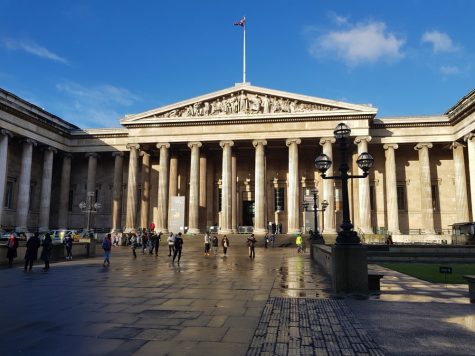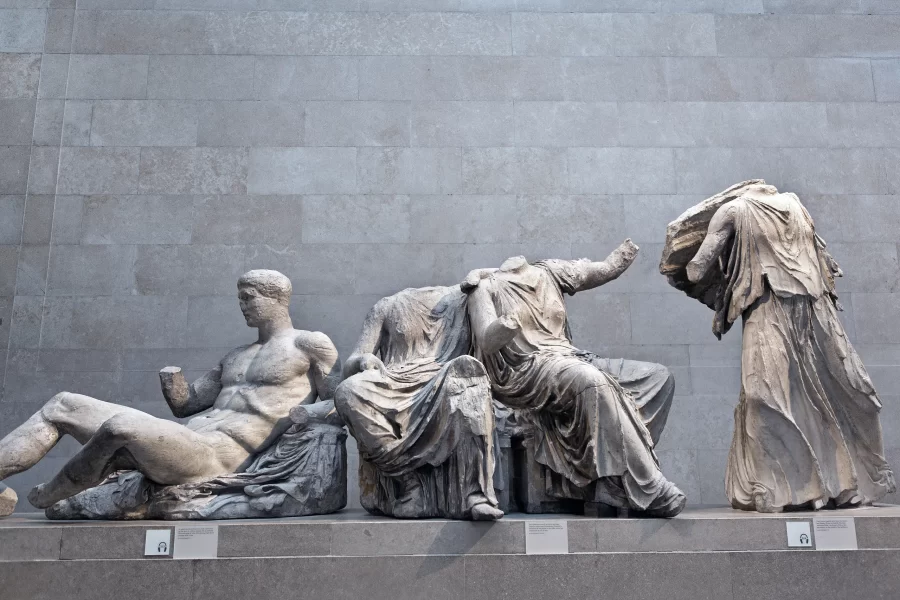To What Extent Should Museums Preserve History?
The Elgin Marbles in the British Museum.
For over 200 years, the Greek Parthenon sculptures, also known as the Elgin Marbles, have resided in the British Museum in London, England. The Ottomans, who at a time ruled Greece, sold these artifacts to the British government. According to the Smithsonian Magazine, this change in ownership has been an ongoing and very contentious issue between England and Greece, and the British Museum sees their ownership as preservation created from a legal trade, while the Greeks believe a very important piece of their culture was wrongfully stolen from them in an act of colonialism.
One aspect of both arguments is over the cleaning techniques the British Museum has employed and how significant the damage was that it caused. Reported by BBC News, Greeks claim the British were too careless when cleaning the sculptures and caused them to lose original and unique features that existed before they were poorly cleaned; the British admit to causing some damage to the sculptures, but they instead view the Greek’s perspective as a political exaggeration and their ownership of the artifacts as beneficial.
“If Lord Elgin did not act as he did, the sculptures would not survive as they do. And the proof of that as a fact is merely to look at the things that were left behind in Athens,” said Ian Jenkins of the British Museum.
Currently, the two nations are slowly negotiating to what appears to be the return of some of the Parthenon sculptures on a loan, as the British government does not want to alter the British Museum Act: prohibits the British Museum from permanently returning any of their collections unless in very rare circumstances. However, stated by The Guardian, the Greeks are still quite adamant about getting back their sculptures completely, so a solution that will satisfy both parties will take time.
“This is not true. There is no such deal,” said a well-placed senior Greek official.
The United Nations Educational, Scientific and Cultural Organization (UNESCO) supports the return of the sculptures through a resolution agreed upon by both sides.
So, overall it can be agreed upon by most that history should be preserved in some form or another, as it is vital for society to understand and be well educated on the past, so people do not repeat the same mistakes in the future, misinterpret the reasons behind current systems/policies, or fail to provide the following generations with a proper foundation for continuing the advancement and protection of the planet. However, it is the way in which this history should be protected that is difficult to agree upon, as clearly demonstrated through the debate between England and Greece, which is further argued in Greek City Times.

An aspect of the education of history is that it has consisted of events and artifacts from all different cultures, ethnicities, and communities. In many ways this is very beneficial, as people can become well versed in what life is like for others all over the world, as well as deepen their perspective to factor in those of others different from them as a result. Without this exchange of cultural knowledge, nations and peoples will become isolated and secluded from one another because of the lack of understanding they have, preventing the unity of groups of people, and, therefore, preventing innovation and advancement that comes from working with others. But, at the same time, this must be done with caution, meaning that artifacts and recorded history should not be stolen through colonialism, which then often leads to appropriation and miseducation rather than the factual education and uplifting of cultural traditions and customs that should be appreciated.
A middleground that can be met between the preservation and dissemination of history is that artifacts can be displayed and protected in nations other than the origin country, but this must be done with the permission of said origin country, and the land and culture itself should not be preyed upon or colonized by others. In the case of the Greeks and England, the Greeks did not chose for their sculptures to be sold off, as it was done by the Ottomans, so even though it was technically a legal trade, the Grecian people have been disrespected by England’s refusal to listen to their pleas for their artifacts’ return. England has had a long and ugly history of colonialism, which included the stealing of other cultures, so for the Greeks, the Elgin Marbles are just another blatant example of that. So, in regards to both Greece and all other nations, their impacts on history have been powerful and the knowledge of those contributions should be widely known and celebrated, but this must be done at the discretion of these nations, since they should have the right to preserve their history as they please.
As someone who is going to be studying history through my pre-law track, I believe it is important for me, and everyone, to understand the context of our world today. To understand oneself, it is important to also know how we arrived at our current state of affairs, because that past has daily effects on all lives whether we notice it or not. I am also Greek, so maybe I am a little biased, but I am proud of what my ancestors have created, produced, and provided for society that has helped shape the past, present, and will continue on into the future. Because of that, I believe my culture and that of others should be embraced, but the founders of those cultural histories should be the ones to decide how they want it to be spread.
Knowledge is power, and depriving society of that knowledge can come with harmful consequences. Without the preservation of history through the use of museums and other restoration services, it will be lost, and that loss would put future generations at a major social and educational disadvantage. In truth, no one really owns the past other than the people who actually lived it, and the same is true for the future. The future will be owned by today’s youth, myself included, because we will be the next innovators, and it will then be our responsibility to carry the torch of our ancestors. And, eventually that future will become our history, so whatever we make of it, I hope it is at the least memorable.









